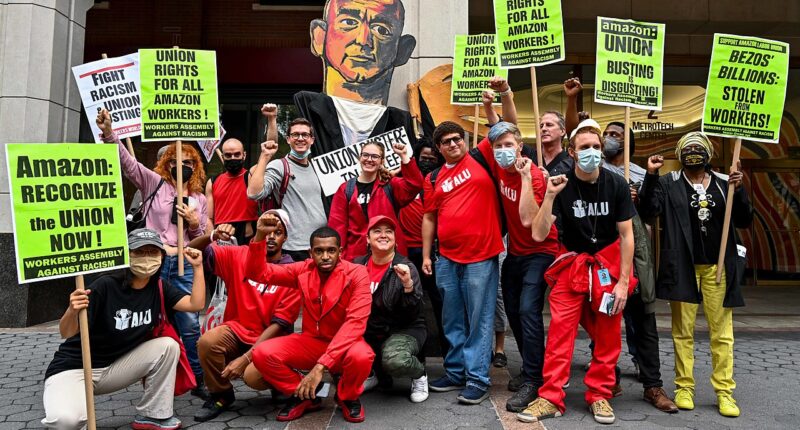America’s largest labour federation has outlined eight principles to protect workers from harmful artificial intelligence applications, warning that unregulated AI threatens jobs, working conditions and civil rights across industries.
The AFL-CIO published its framework for worker-centred AI today, calling for strengthened collective bargaining rights, transparency requirements and accountability measures as AI systems increasingly monitor, evaluate and control workers.
The labour organisation, representing 63 national and international unions and nearly 15 million workers, warned that AI is being deployed rapidly with few guardrails in place, creating risks of job displacement, workplace surveillance and algorithmic discrimination. The principles seek to ensure technological change benefits workers rather than prioritising short-term corporate gains.
“Harmful AI is not inevitable – the choices we make today will determine the future of cutting edge technology and work,” the AFL-CIO stated in the report. “And doing nothing, as Big Tech special interests would recommend, is a choice – the wrong choice.”
The framework’s first priority strengthens labour rights and broadens collective bargaining opportunities. The federation argued that AI adoption in workplaces should be negotiated between labour and management to ensure technology makes work better, respects labour rights and minimises workforce harm through genuine collaboration.
If AI leads to job disruption or displacement, workers must receive proper advanced notice of position reductions, meaningful reemployment and income support, and effective training and retraining, according to the principles. Strong enforcement of labour rights is essential to prevent AI from being weaponised as a union-busting tool, with surveillance systems potentially tracking worker conversations and manipulating schedules to prevent organising.
The second principle advances guardrails against harmful workplace AI uses. The AFL-CIO warned that AI systems can monitor, evaluate and control workers without their knowledge, punishing employees for insufficient smiling, taking bathroom breaks, or pushing them to work harder and faster in unsafe ways. Such applications can lead to psychological stress, increased injury risk, burnout and turnover.
Workers deserve to know what data is being collected about them and how it is being used, with clear consent and opt-in requirements, the federation stated. Automated decisions must be reviewed by humans, and workers must be given the right to appeal AI-driven decisions about scheduling, discipline, pay, hiring and firing, with protection from retaliation.
The third priority supports copyright and intellectual property protections. Workers in creative industries and sports face continuing risk of seeing their works, voices and likenesses appropriated by generative AI without consent or compensation, threatening livelihoods dependent on effective intellectual property rights.
A worker-centred workforce development and training system forms the fourth principle. The AFL-CIO recommended joint labour-management partnerships and union-centred, high-quality training programmes, including Registered Apprenticeships, rather than low-quality training programmes promising quick fixes whilst failing to help workers meaningfully.
The labour movement’s network of union training centres represents the nation’s largest training institution outside the US military, the federation noted, with proven track records preparing workers for high-quality, family-sustaining jobs.
The fifth priority institutionalises worker voice within AI research and development. Workers are often excluded from technology development processes despite their expertise and status as end-users, the AFL-CIO stated. When governments use taxpayer dollars to fund AI research, workers and unions should participate from the beginning to create more effective, safer technology and avoid poor development and implementation decisions.
The sixth principle requires transparency and accountability in AI applications. The federation warned that many AI systems function as black boxes lacking transparency, leaving workers unaware of when and how technology is being used. Allowing algorithms to secretly determine hiring, promotion, discipline or termination decisions creates recipes for discrimination and unfairness.
Easy-to-understand explanations and meaningful human review of decisions are essential to upholding fairness, especially given high error rates found in various AI systems, including large language models, according to the principles. Workers must have the right to use professional judgment to override AI decisions without retaliation, especially in safety-sensitive or life-threatening situations.
Strong accountability and enforcement for AI companies and employers that harm workers is necessary, with legal responsibility meaningfully enforced including significant financial penalties to incentivise safe system development and deployment whilst providing remedy for caused harms.
The seventh priority models best practices for AI use through government procurement. Public tax dollars should not purchase AI systems that are unsafe, harm public sector workers or reduce government service quality, the AFL-CIO argued. Public agencies must set gold standards for responsible AI use, requiring systems upholding public interest and respecting workers’ rights including transparency, privacy, intellectual property rights and civil rights.
Federal, state or local agencies should not incorporate new AI-enabled tools impacting work or services without negotiating and collaborating with the workforce and their unions during early development stages, according to the principles.
The final principle protects workers’ civil rights and upholds democratic integrity. AI systems may amplify bias and discrimination, making existing inequalities worse through systems difficult to detect and challenge, the federation warned. When algorithmic decision-making systems exclude persons based on race, gender, age, disability or other protected characteristics, such uses violate civil rights and must be barred.
Threats extend beyond workplaces into broader society. When AI systems produce misinformation and deepfakes, they undermine elections and democracy, the AFL-CIO stated. The ability to quickly, easily and inexpensively use generative AI to produce realistic content has filled the internet with potentially false information, undermining public trust and informed public discourse fundamental to upholding democratic elections and systems.
The federation contrasted two potential futures for AI in the workplace. One vision shows new technology making work better and safer, with good union jobs offering fair pay and improved job quality, where working people have economic security knowing companies and public agencies must follow rules ensuring AI is used safely, responsibly and fairly.
The alternative future, without common-sense rules and true commitment to boosting worker voice, risks good jobs, working conditions, safety, economic security, and worker and civil rights. The AFL-CIO noted threatening AI uses are already emerging as elected officials trust AI developers to act responsibly when they are failing to protect people from harm with few guardrails in place.
The labour federation argued AI should not repeat past mistakes where periods of globalisation and automation prioritised short-term gains for companies and investors whilst leaving working families and communities to bear costs. There is opportunity at this moment to avoid previously failed approaches and instead advance new strategies producing better outcomes for working people and the country.











